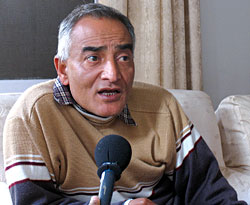With a week to go till municipal polls, Minister of Communications and Information Shrish Shumshere Rana spoke to Nepali Times and blamed political parties for not responding to the king's offer to participate in the government.
Nepali Times: How is it going for you as a journalist-turned-minister? 
KUNDA DIXIT
Shrish Shumshere Rana: I'm learning. Much of my time is spent responding to the personal agendas of people because the government remains the largest employer. I am surprised at the extent of lobbying done for even small positions. This concentration of power in ministries or ministers perhaps even contributed to the demise of democracy here. This is a totally new realisation for me.
As a journalist you were trained to look at both sides of a story but now as a minister you have to defend one side. Is that out of your own personal conviction?
Let me put it this way: I have not had to lie as a minister. I have been saying the same things that I used to say before I became a minister.
There has been gradual erosion in Nepali politics.yet I am surprised that other journalists were not able to see it.
See what?
The tendency to drag the monarchy into politics every time it did not suit individuals and organisations. Every time there was a power tussle within one or other political party, they dragged in the king, demanding a partisan approach rather than a constitutional one.
But in the past year we have seen the king himself descend to the level of everyday politics.
On no account has the king come into politics-he has been dragged into it. On 1 February, the king invoked Article 27 and came in as chairman of the council of ministers so that no one would have to fight about who would lead the government. All his public statements since then have asked for participation from all political sectors.
But the constitution does not have a provision for the chairman of the ministers' council.
Yes there is no such provision. But there is a provision that says the king is the symbol of national unity and the same article says that the king is the guarantor of the constitution. Had the political parties agreed to address the country's crisis, the king would have very willingly reverted to his own position. It does seem that the major political parties would rather use their clout to join the agitation on the streets than solve national problems.
So the real problem seems to be a lack of trust between the king and the party leadership?
Well if the king did not trust the political parties, he would not have been appealing to them to participate in the government. He is a constitutional monarch. Those who say they support the constitutional monarchy, however, interpret it in their own partisan manner.
In the past year, Nepal's international isolation has deepened and now even the Chinese have shifted their stand.
I see no shift in the Chinese stand. What the Chinese have been saying is that this is an internal matter and they continue to say it. Nepal is a strategic country, they will watch it. If they say they will watch it, they will watch it.
But the Chinese have for the first time expressed serious concern about what is happening in Nepal.
The concern is genuine. The destabilisation of Nepal is a matter of serious concern for both China and India.
Will there be any concrete change in the government's media policy?
The journalism sector has lost its credibility in many ways. There is a need to correct the disorganised state of Nepali journalism and make it more professional. I am for filling the vacuum in media-related laws but those with vested interests will obviously not like it. If the press becomes a hurdle in the government's efforts to restore democracy, we will have to re-examine its role.
Has there been a genuine effort for reconciliation with the parties?
What is a genuine effort? After 4 October 2002 the king kept on meeting the parties' leaders for 27 months and asked them to form a national government. The leaders just sabotaged each other. Even after 1 February the parties did not respond to calls to join the government. The doors for talks are always open. But, there has to be a constitutional meeting point.
So what is stopping you?
It is high time we pinpoint (the blockage): the unconstitutional rigidity of those who demand that the king should be constitutional but themselves are not respecting the constitution. The state is very much within the constitution and that is why we have been saying that elections are the way to restore parliament so we can bring the constitutional process back on track.
Why was the government so negative about the party-Maoist pact?
We weren't negative. We were not even part of the talks. Madhab Kumar Nepal was saying that he did not have to go to India to meet the Maoists and he did go. It was India that first labelled the Maoists "terrorists". Suddenly the terrorists surface in New Delhi and everybody flocked there and came up with what they call a pact. There is only one point in which they seem to have an actual agreement and that is to scuttle elections. If they use that agreement to scuttle elections, then we will have to prepare ourselves for that.


